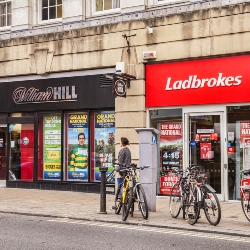History of the UK’s Betting Shops

Viewers tuning into TV in the UK throughout the day are confronted by dozens of gambling ads, with the popularity and prevalence of gambling in the country continuing to grow exponentially. Given the current state of the UK’s gambling market, it is hard to believe that gambling has only been legal in the UK for only a little more than 50 years, while television advertising for online casinos and sports betting was only permitted in September 2007. Let’s take a look back at the history of gambling in the UK, and how the industry has grown at such a phenomenal rate.
1960: The Start of It All
The UK passed the Betting and Gaming Act in 1960 allowing betting shops to be legally operated in the country for the very first time. The UK Racecourse Betting Control Board was then able to license operators to establish betting parlors where people’s bets could be placed with “tote odds”, which means that instead of paying fixed odds, their dividends were paid out from bets placed in a betting pool. The law was passed to curb illegal gambling and combat criminal activities that stemmed from it.
The 1960s
The first betting shops opened on May 1, 1961, and would-be bettors seemed to take to them right away. While these betting shops with dark windows to conceal who was inside had an air of privacy, they were also seen as safe places by the public. Soon, the negative connotations usually associated with gambling subsequently began to dissipate, and people who had never before dreamed of betting started visiting the bookies. As gambling grew, industry leaders emerged, including Ladbrokes and William Hill, with their betting shops attracting mostly blue collar workers who hoped to win big on the horses.
The Decades That Followed
From the 1960s through to the 1990s, gambling in the UK grew and grew, although the industry remained largely unchanged, and operating under the same laws. In the meantime, William Hill and Ladbrokes continued to stay on top of the industry, while two newer companies Coral and Mecca, emerged and gained market share. By 1986, these four betting companies were widely known throughout the UK.
Rise of the Premiere League
The Premiere League debuted in 1992 after England’s top soccer teams decided to break away from a Football League First Division originally founded in 1888. They did so in order to cash in on lucrative TV rights deals, and the betting parlors also soon got in on the action. Initially, only UK residents were able to place bet on the games, and had to wager on three games at a time to satisfy the rules. The law later became more relaxed, though, as the appetite for sports betting grew, and the UK’s betting parlors soon started reaping big profits.
Fixed Odds Betting Terminals
2001 marked the year when fixed odds betting terminals (FOBT) first appeared in gambling shops in the UK. With these terminals, bettors could place bets quickly for a minimum of £1, and with a maximum single payout of £500. These machines naturally increased profits for bookmakers, but also won them plenty of criticism as many gambling opponents protested that they made it too easy for gambling addicts to wager, and subsequently called them the “crack cocaine of gambling”.
A Win for Gambling
As the big names in betting grew, so did their influence in the UK. By the 1990s, the Big Four were lobbying hard to have a major restriction on gambling eliminated, and in 2002 they finally succeeded. It was then that the UK government abolished the 10 percent tax on gambling winnings that kept some would-be bettors from placing bets.
The Advent of Online Gambling
In 2014, the UK legalized online gambling. While operators have had the chance to gain licenses to operate their own sites, the legalization of online gambling has made a dent in their betting shop revenues. Companies are now finding it harder to remain competitive in the post-online gambling age, and in recent years the industry has seen companies consolidate and merge with others in order to stay afloat. Nevertheless, it seems that still more changes will be needed to keep betting shops viable in the UK as more people are turning to computers and mobile devices to gamble remotely.










